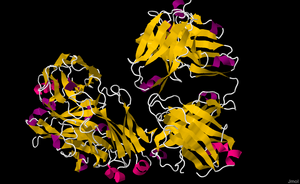Rituximab
 |
|
| Monoclonal antibody | |
|---|---|
| Type | Whole antibody |
| Source | Chimeric (mouse/human) |
| Target | CD20 |
| Clinical data | |
| Trade names | Rituxan, MabThera, others |
| AHFS/Drugs.com | Monograph |
| Pregnancy category |
|
| Routes of administration |
intravenous infusion only (never bolus or "push") |
| ATC code | |
| Legal status | |
| Legal status |
|
| Pharmacokinetic data | |
| Bioavailability | 100% (IV) |
| Biological half-life | 30 to 400 hours (varies by dose and length of treatment) |
| Excretion | Uncertain: may undergo phagocytosis and catabolism in RES |
| Identifiers | |
| CAS Number | |
| DrugBank | |
| ChemSpider |
|
| UNII | |
| KEGG | |
| ChEMBL | |
| ECHA InfoCard | 100.224.382 |
| Chemical and physical data | |
| Formula | C6416H9874N1688O1987S44 |
| Molar mass | 143859.7 g/mol |
|
|
|
Rituximab, sold under the brand name Rituxan among others, is a medication used to treat certain autoimmune diseases and types of cancer. Specifically it is used for non-Hodgkin's lymphoma, chronic lymphocytic leukemia, rheumatoid arthritis, idiopathic thrombocytopenic purpura, and pemphigus vulgaris. It is given by slow injection into a vein.
Common side effects, which often occur within two hours of the medication being given, include rash, itchiness, low blood pressure, and shortness of breath. Other severe side effects include reactivation of hepatitis B in those previously infected, progressive multifocal leukoencephalopathy, and toxic epidermal necrolysis. It is unclear if use during pregnancy is safe for the baby. Rituximab is a monoclonal antibody against the protein CD20, which is primarily found on the surface of immune system B cells. When it binds to this protein it triggers cell death.
Rituximab was approved for medical use in 1997. It is on the World Health Organization's List of Essential Medicines, the most effective and safe medicines needed in a health system. The wholesale price in the developing world as of 2014 is US$148–496 per 100 mg. In the United Kingdom this amount costs the NHS approximately £182.
...
Wikipedia
